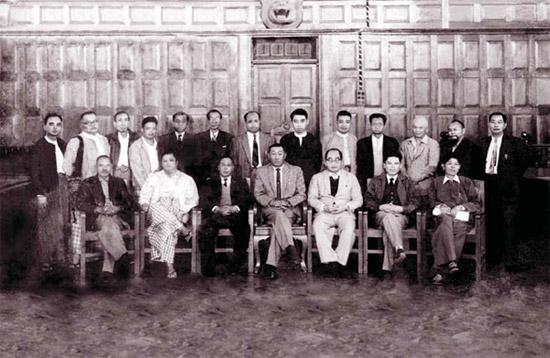Since her release from house arrest in November 2010, Daw Aung San Suu Kyi has made two publicized promises:
- That she would hold a new Panglong conference
- That one of her priorities would be the amendment of the 2008 constitution
Since then, many people, both Burman and non-Burman alike, have rallied behind her believing, and hoping, that with her in the leading role, nothing is impossible.

But is another Panglong necessary?
At least, believe it or not, Naypyitaw, or its advisers, seem to think so. Meeting Shan, Karen, Karenni, Chin and Kachin leaders on 19 November 2011, the presidential envoy Aung Min, to the surprise of his ethnic counterparts, announced a 3 phase roadmap for peace in Burma: Ceasefire, Development and a Panglong-type conference. (One adviser recently said the actual 3 phases planned by them was: Ceasefire and Development, Political Dialogue and Panglong-type conference. However, it has never been officially announced.)
But, this new Panglong, is it to be held for the purpose of dumping the old Panglong Agreement to seek a new one?
Is the old one outdated and irrelevant as one of the junta generals reportedly told the Kachins a few years back and a brand new one is what we all need?
And how are we going to put the agreement into a practical modus vivendi?
As the writer is one of those people who strongly believe in looking back to move ahead, I think we should go back to the original Panglong to see if we can find something wrong in it.
The principal terms of the 9 point agreement were:
- Creation of a Frontier Areas ministry (which can be compared to the Ministry of Border Affairs today) run by a member of the Frontier Areas
- Creation of a Kachin State
- Full autonomy in internal administration
- Financial autonomy
- Human Rights and Democracy
As far as the writer is concerned, there is nothing wrong with it, except other states were yet to be agreed to be created. (Only the Karenni and the Federated Shan States were states in effect at that time). All the terms could still serve as guiding principles for the Union constitution.
However, the drafters of the 1947 constitution didn’t think so. This had led to a hastily-drawn and hastily-approved unitary charter that had given rise to problems between the Burman-dominated central government and the non-Burman states such as:
- Appointment of chief minister of Shan State by the Union Prime Minister in opposition to the majority will of the Shan State MPs
- Meddling in state internal affairs
- Human Rights abuses by the Burma Army
While hot heads like myself, that exist in every society, were going for the “tit for tat” approach, cooler heads knew better. They decided that the problem was with the constitution and, therefore, it must be amended based on the principles laid down at Panglong.
In 1961, at the Taunggyi seminar, the ethnic nationalities of Burma came up with a 5 point proposed outline for the amendment of the constitution:
- Burma Proper must be a constituent state like Chin, Kachin, Shan and others
- Equal power to the two Houses of Parliament
- Equal representation for each state in the Upper House
- Reservation of the following subjects for the Union government and the remaining subjects for the states: Foreign affairs, Defense, Finance, Coinage and paper currency, Posts and Telegraphs, Railways, Airways and Waterways, Union Judiciary and Sea Customs Duty
- Fair distribution of the revenue collected by the Union Government among the states
Gauging the sentiments prevailing at that time, I don’t think all the demands would have sailed through the Parliament. But some of them would have and the non-Burmans would have said, “Well, that’s democracy. There’s still another time to try it again.”
But the military thought otherwise. What followed was as we all know. No reader needs any repetition from the writer.
Summing up, I would say that:
- Another Panglong will be needed to re-affirm the principles laid down by the conference in 1947
- The same Panglong will also re-examine the 1961 outline to amend the constitution and lay down a new outline, in line with the needs and realities of the 21st century
Last but not least, it will also need a guarantee that another military coup will not be forthcoming claiming once again “to save the country from being drowned in shallow waters.” What we need now, both for ourselves and for our posterity, is a virtuous circle, not a vicious one.


